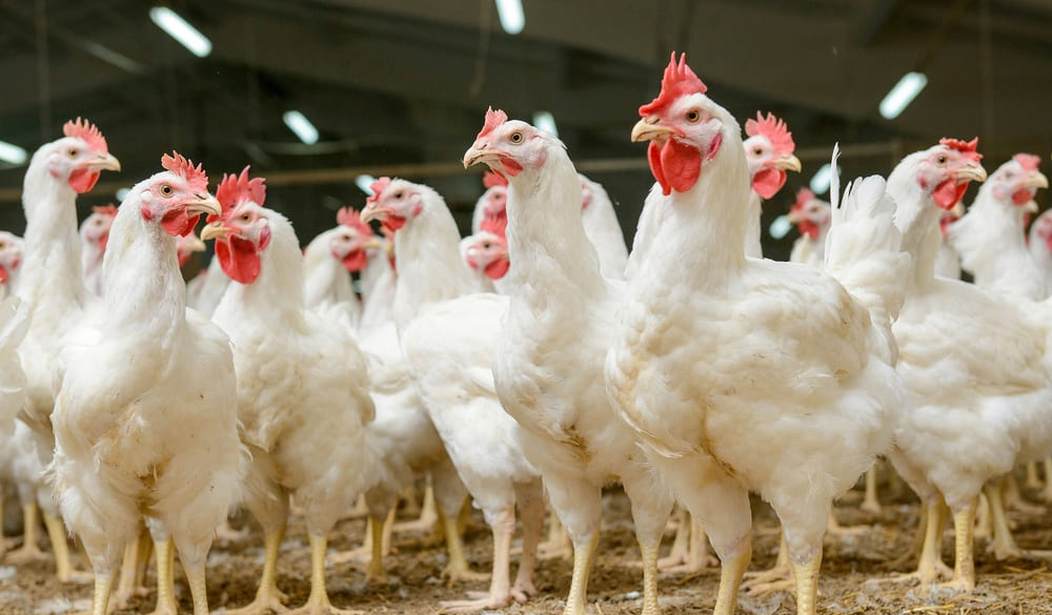A report is out about new technology that will enable poultry consumers to track the life and times of the roast chicken on their table. In the near future, diners will have the option of becoming fully abreast of a bird’s history, from birth to butcher block.
From Mashable SE Asia: “Chinese online insurance company ZhongAn Online has developed a new GPS-tracker for poultry called GoGo Chicken, according to the Wall Street Journal. The device fits around the animal’s leg while sensors monitor information like the chicken’s environment, what it eats, and how much exercise it gets.”
And presumably whether or not it was happy.
Interesting, sure, but the Portland Fox affiliate anchor reading the item on a recent morning broadcast missed the obvious life-imitates-art angle. Comedian Fred Armisen and comedienne/rock star Carrie Brownstein have already been there and eaten that in a famous skit from the IFC series Portlandia.
Following the link to the Journal story reveals that their savvy reporter did not miss the prescient Portlandia angle. In fact, it comprises the lede.
In a series of scenes from the show’s pilot episode, Fred and Carrie, whose hilarious characterizations were subsequently blamed for turning the Rose City into a mecca for hipsters and slackers (we were already full up), ask their restaurant server for information about the chicken they’re considering for dinner. This being Portlandia, where such a concern is far from far-fetched, the female server has all the information they need. The couple eventually travels to a farm, where they meet the polygamist crypto-erotic owner and witness firsthand the environment in which “Colin” was fed, housed, cared for, and ultimately “processed.”
It’s doubtful that Colonel Sanders ever meant for anything like this to happen, but it is happening. The interest in knowing heretofore unimaginable things about the food we’re eating is growing. In the 1970s, the mantra was, “You are what you eat.” With technological advances enabling evermore specifics about the formerly-sentient foodstuffs we ingest, the new mantra seems to be, “Know who you eat.”
It is no great leap to take the idea of edibles-tracking further, to include meat. Will we someday know that the steak on the barbie came from a Bakersfield, Calif., steer named “Budsky,” who was known for being grumpy and distant with his corral-mates? Will information on packaging eventually reveal that the bacon in your BLT was once attached to the loins of a happily-wallowing sow named “Antionette”? Such data would take the idea of “meat is murder” to a whole new level.
Lamb chops? Look, we’ve all seen The Silence of the Lambs, and IMO the less we know the better.
Ridiculous as it may seem, the Portlandia writers saw this coming, and there’s no telling where it will end. Soon enough you may be able to track the life of the braised mahi-mahi served with rice and asparagus at the local seafood restaurant. And know that it formerly swam off the coast of Oahu and put up one hell of a fight before being hauled over the gunwale.
And though we may not want to think about it, there is a new study that concludes that crabs and lobsters absolutely feel pain when thrown into a boiling pot. The animal ethics-minded among us will inevitably demand that “Crusty” be humanely euthanized prior to his final submersion.
Some folks believe plant life has demonstrable consciousness. That’s probably a chlorophyllin bridge too far. Beyond soil content and degree of freshness, what do we really need to know about the environment in which a stalk of celery grew to maturity? It is possible, however, for completely different reasons, that we may someday be provided with GPS tracking information about the immigrant agricultural worker who harvested that celery.
Do happier, free-ranging chickens taste better? Wouldn’t a chicken with more room to roam be more muscular, and thus tougher? These are questions that must be grappled with in the debate about the ethical treatment of animals that are mass-consumed by modern societies. Considering the demand, affording every chicken served in the United States alone a free-range standard of living would have a considerable impact on a farm’s bottom line. How much more would people be willing to pay for a pampered “Colin” versus a “Gomer,” who spent his life cooped up and miserable in what is tantamount to a fowl concentration camp somewhere in North Dakota?
News that the Chinese are equipping our future chicken dinners with GPS devices does raise the question of intellectual property rights. The name for the device — GoGo Chicken — seems vaguely Americanized, and at the same time disingenuous, considering where all those millions of chickens are going.
A growing interest in “knowing” what many Americans would consider TMI about dinner is not a particularly surprising development in this progressive, homegrown, environmentally sustainable day and age. Nor would learning that this Chinese “insurance” company stole the idea from us.
Just make sure the device has been removed before you dig in.









Join the conversation as a VIP Member